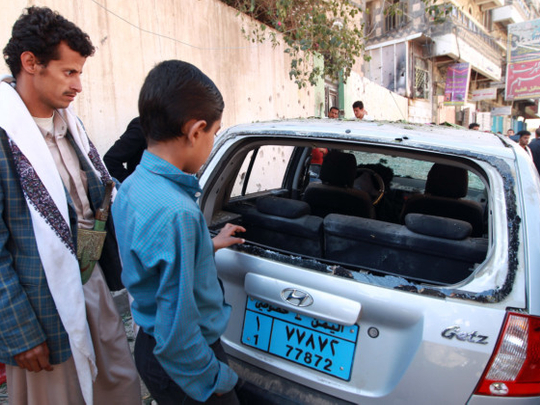
Sana’a: Gunmen kidnapped on Monday a European oil-sector employee in the Yemeni capital hours after it was rocked by overnight explosions, in the second abduction of a Westerner in four days.
The renewed violence comes as the government struggles to end deadly fighting between Shiite Huthis and powerful tribesmen in the north, and seeks to turn the Arab republic into a federation.
An official from the oil sector identified the latest kidnap victim as a British citizen who worked in the oil industry, although there was no immediate confirmation of the claim.
“Gunmen in a car kidnapped the British man at around 9am near a grocery store in Hada,” a tightly-patrolled district in central Sana’a which is home to several embassies, the official said.
Witnesses said the kidnappers struck the Briton on the head with the butt of a rifle, before driving him away towards an unknown location.
The British embassy could not immediately confirm the reported abduction.
“We are aware of the news. We still cannot confirm,” an embassy spokesman said.
On Friday tribesmen abducted a German citizen in Sana’a and later said they snatched him to press authorities to release jailed relatives.
The foreign ministry said the man is being held in a tribal region in the eastern Marib province.
Hundreds of people have been kidnapped in Yemen over the past 15 years, mostly by tribesmen who use them as bargaining chips in disputes with the government. Nearly all have been freed unharmed.
Al Qaida militants have also abducted foreigners in Yemen and is now holding a South African man, as well as a Saudi and a Yemeni diplomat.
In another indication of the growing unrest in the country, a mortar slammed near the French embassy overnight Sunday, while a car bomb exploded metres away in the Hada diplomatic district, police said.
The French foreign ministry said it had no indication that the explosions had targeted its mission.
Yemen eyes ceasefire in north
The attacks happened after midnight and wounded three people, the police source said.
The shell fell by a concrete block, installed for security reasons on a road leading to the embassy, the source added.
That blast came shortly after a car bomb exploded on the nearby main road, close to the residence of former president Ali Abdullah Saleh.
Saleh continues to play an influential political role and is accused by critics of trying to destabilise the country since an uprising led to his ouster in February 2012.
Two other explosions near the defence ministry left no casualties, according to police.
Meanwhile, President Abd Rabbo Mansour Hadi dispatched Sana’a governor Abdul Qader Hilal to the northern Amran province to try and clinch a ceasefire to end bloody clashes there.
Scores of people have been killed in a month of combat between the Al Houthi rebels and members of the powerful Hashid tribe that erupted January 5.
On his page on Facebook, Hilal wrote that both sides had “welcomed” his mediation efforts and “agreed to sign a deal for ceasefire, opening roads, and the withdrawal of fighters”.
Tribal sources said fighting which had raged last week killing an estimated 150 people and wounding 400 others subsided on Monday to give way to mediation efforts.
The Al Houthi rebels have been pushing out from their stronghold in the mountains of the far north to other areas nearer the capital to expand their hoped-for autonomous unit in a promised federal Yemen, political sources say.
Hadi has pledged that Yemen will adopt a federal constitution in a bid to address local grievances that have fuelled violence across the Arab world’s poorest country.
But at a ceremony last month to mark the conclusion of a troubled 10-month national dialogue, he put off any decision on the thorny issue of how many components it will have, promising that a special commission will decide.
The prospect of a federal Yemen was originally mooted as a way to address grievances of the formerly independent south, where secessionist violence also has been rising.












